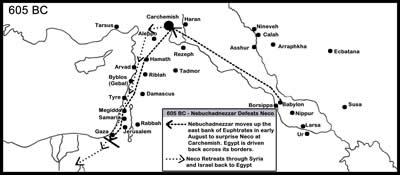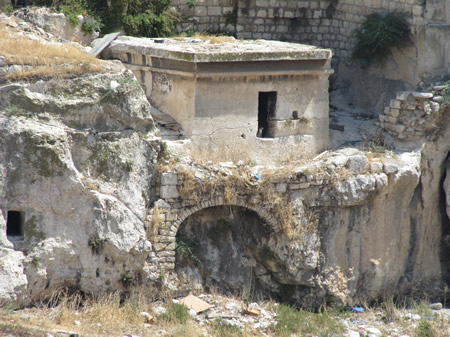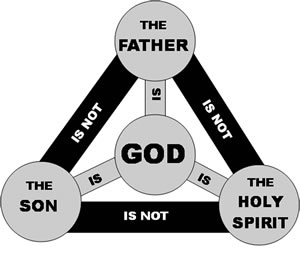| |

|
August 15 - Morning
"When Baruch son of Neriah wrote on a scroll the words Jeremiah the prophet dictated in the fourth year of Jehoiakim son of Josiah king of Judah, Jeremiah said this to Baruch:
'This is what the Lord, the God of Israel, says to you, Baruch:
You said, ‘Woe to me! The Lord has added sorrow to my pain; I am worn out with groaning and find no rest.’
But the Lord has told me to say to you,
‘This is what the Lord says:
I will overthrow what I have built and uproot what
I have planted, throughout the earth.
Should you then seek great things for yourself?
Do not seek them! For I will bring disaster on all people, declares the Lord, but wherever you go I will let you escape with your life.’ "
- Jeremiah 45 |
 |
|
| A Personal Prophecy for Jeremiah's Scribe |
|
|
Jeremiah 45 records an event from the year 605 BC.
It appears that the scribe Baruch son of Neriah was not only a professionally trained scribe, but was in the upper class and, was likely, a royal scribe of King Josiah that had been appointed to assist Jeremiah and record his prophecies.(click map/HERE)
|
 |
The events in the year 605 BC where monumental in the history of the Middle East. In 609 BC Nebuchadnezzar had defeated the Assyrian Empire at Carchemish, but Pharaoh Neco had come out of Egypt to drive Nebuchadnezzar back into Babylon. Now four years later in 605 Nebuchadnezzar, who was still the general of his father’s military forces, returns in early August to Syria and, in a surprise attack, defeats Pharaoh Neco at Carchemish. (2 Kings 24:1) Nebuchadnezzar sweeps through Syria, Phoenicia and Israel as he drives Neco back across the Egyptian border. On August 16 Nebuchadnezzar’s father, the Babylonian king Nebopolazzar dies. When news reaches Nebuchadnezzar he immediately returns to Babylon, but not until he has given orders for royal captives (including Daniel, Daniel 1:1-13; Jeremiah 46:2; Jeremiah 52:28-30) from each of the countries he has defeated, be to taken back to Babylon. Nebuchadnezzar is back in Babylon by September 7.
It is in the midst of the turmoil of this year that the Lord speaks to Baruch through Jeremiah concerning Baruch’s own ambitions, life plans and fears. It appears that the young man Baruch had personal plans that Jeremiah describes as “great things for yourself.” Baruch may have been planning of expanding his scribal skills into a business or seeking clients who could pay him a more lucrative salary than he earned as a public servant or working for the prophet Jeremiah. Whatever Baruch’s personal plans were, he is told in the year 605 to stop complaining. Baruch’s good life in the palace was upset when the good King Josiah was killed in 609 BC, and became worse now in 605 when King Jehoiakim had been taken as a temporary captive into Babylon along with the many members of the royal family. Many of these might have been friends of Baruch who will never return.
(For example, Baruch's brother, Seraiah, accompanied King Zedekiah to Babylon in 594 BC when Nebuchadnezzar desires to question Zedekiah concerning rumors of a Judean revolt: Jer. 51:59)
As Baruch writes the words Jeremiah is dictating concerning more national judgment in the near future, Baruch realizes his life is not going to be what he had grown to expect and his future was not going to be as he had planned. While Jeremiah was dictating Baruch either thought or said,
“Woe to me! The Lord has added sorrow to my pain; I am worn out with groaning and find no rest.” – Jeremiah 45:3
And, the Lord responded to Baruch with a rebuke, a warning and a promise. Baruch was free to respond or rebel to Jeremiah’s words just like the people of Judah were. The Lord said to Baruch that day:
“I will overthrow what I have built and uproot what I have planted, throughout the earth. Should you then seek great things for yourself? Do not seek them! For I will bring disaster on all people, declares the Lord, but wherever you go I will let you escape with your life.” – Jeremiah 45:4-5
The Lord was doing something bigger than Baruch's plans could handle. Baruch would have to adjust or perish.
(Baruch's seal impression has been found on a bulla - See image HERE and HERE. Details HERE and HERE.) |
|
|
 |
“We must be persuaded not only that as God once formed the world, so he sustains it by his boundless power, governs it by his wisdom, preserves it by his goodness, in particular, rules the human race with justice and judgment, bears with them in mercy, shields them by his protection; but also that not a particle of light, or wisdom, or justice, or power, or rectitude, or genuine truth, will anywhere be found, which does not flow from him, and of which he is not the cause; in this way we must learn to expect and ask all things from him, and thankfully ascribe to him whatever we receive. For this sense of the divine perfections is the proper master to teach us piety, out of which religion springs.”
– John Calvin in “Institutes of the Christian Religion” (read it here) |
 |
It is important to realize our limitations in our own personal knowledge of Greek but at the same time recognize the inexhaustible supply of resources we have available to study Greek. There has never been a time (like the 20th/21st century), in which so many accurate study tools written by well-trained Greek scholars have been readily available for a believer who wants to gain insight into God’s written revelation.
Here are some of the
Greek study tools:
1. Greek Text – Scholars have worked through all the appropriate Greek manuscripts to produce the best Greek New Testament.
2. Greek/English Interlinear – A translator has taken the Greek text and translated each line word for word into English.
3. Greek Grammars – A textbook by a Greek teacher that takes you step by step through the process of learning the Greek language.
4. Greek Concordance – Scholars have taken every Greek word in the Greek New Testament and listed them in alphabetical order along with each of its Scripture references.
5. English Concordance – Each English word from a particular translation is listed alphabetically along each of its Scripture references.
6. Greek Lexicon – Is a dictionary, but also provides examples of how the word was used in other writings written during the time of the New Testament..
7. Greek Dictionary – A Greek Dictionary can provide a simple one-to-three word definition, which is good for a quick reference.
8. Greek Reference Sets – Are similar to commentaries but the author focuses on the exegetical work from the meaning of the Greek and linguistic insights.
9. Other Reference Tools – Other useful books are word study, lexical aids, linguistic keys, and reference works that help bring the Greek New Testament a little closer to the reader. |
|
| |
|
|
| |
|
 |
 |
 |
 |
Children’s education |
Spiritual growth and production in church programs and activities |
Social Justice |
Libya |
|
|
| |
 |
 |
 |

Diagram of the historically correct view of the Trinity.
(More teaching here. False views of the Trinity here.)
|
Tomb of Pharaoh's Daughter - This tomb is further south under the village of Silwan and is known as the Tomb of Pharaoh's Daughter. This tomb was cut during, or right after, the Hasmonean age but is unidentified. Originally this tomb, which looks like a small house, was topped with
a pyramid roof cut from a single rock.
Sometime after 700 AD the pyramid roof was cut up into blocks to be reused. The process caused great damage to the tomb. More damage was
caused by a hermit who used this tomb as a home. There was an ancient Hebrew inscription in the upper left corner of the entrance, but now
only two letters remain. The rest of the inscription was destroyed when the hermit widened the doorway. (More tombs in the Kidron here.) |
(click on images for larger size) |
| |
|
| Details and Explanation of Sets & Reps Devotional System Here |
 |
|
|
| |
| |
| |
| Reps & Sets is a daily Bible devotional for Christians from Generation Word Bible Teaching used each morning and evening. |
| |
|